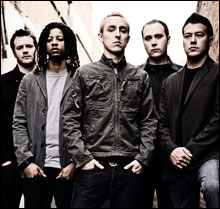 Last year should have been a very good one for Yellowcard — five guys in their mid 20s who had seen their under-the-radar, Los Angeles–based indie pop-punk band evolve into a multi-platinum major-label behemoth in less than two years. Conquerors of TRL, Top 40 and rock radio, and the hearts and minds of the Warped Tour set and The OC via its cheerful, if lightweight, 2003 breakthrough Capitol Records debut, Ocean Avenue, the quintet — singer/guitarist Ryan Key, guitarist Ben Harper (no, not that Ben Harper), bassist Pete Mosely, drummer Longineu “LP” Parsons, and violinist Sean Mackin — welcomed 2005 by finally getting off the road after a grueling 18-month world tour. A few months of rest, relaxation, and enjoying the spoils of their success awaited, followed by the commencement of work on an Ocean follow-up, which they were set to approach with the confidence that momentum, a dedicated fan base, and positive support from Capitol were behind them.
Last year should have been a very good one for Yellowcard — five guys in their mid 20s who had seen their under-the-radar, Los Angeles–based indie pop-punk band evolve into a multi-platinum major-label behemoth in less than two years. Conquerors of TRL, Top 40 and rock radio, and the hearts and minds of the Warped Tour set and The OC via its cheerful, if lightweight, 2003 breakthrough Capitol Records debut, Ocean Avenue, the quintet — singer/guitarist Ryan Key, guitarist Ben Harper (no, not that Ben Harper), bassist Pete Mosely, drummer Longineu “LP” Parsons, and violinist Sean Mackin — welcomed 2005 by finally getting off the road after a grueling 18-month world tour. A few months of rest, relaxation, and enjoying the spoils of their success awaited, followed by the commencement of work on an Ocean follow-up, which they were set to approach with the confidence that momentum, a dedicated fan base, and positive support from Capitol were behind them.
Instead, Yellowcard spent the bulk of 2005 mired in tumult. The controversial ousting of founding member Harper, which spurred fan backlash that has yet to abate, took center stage; intra-band health issues and sudden concerns about how the new music would be received by the faithful added more trauma. It wasn’t enough to kill a promising career — Yellowcard are still together at the dawn of 2006. They’ve just released an album, Lights and Sounds, that represents major artistic growth, and they’ve embarked on yet another tour, one that comes to Axis on January 27. But as Mackin explained over his cellphone from a Los Angeles coffee shop recently, they’re still struggling to shake off all the turmoil.
“We try to be as glass-half-full as possible. You gotta take the bad with the good, that’s just how we’ve always looked at life. You can kinda hear a little hopelessness in our new record, kind of a little bit of lost faith, although I think you can still kinda feel some of the optimism that we’ve always had. But yeah, I think that the state of the band over the years, the state of the industry, the state of the world . . . all of that played a role in the darker, serious side of this record.”
Sure enough, Lights and Sounds offers nearly an hour of music that’s far weightier than the band’s previous efforts. The disc announces its intentions with “Three Flights Up,” a minute-long opening instrumental that drapes a simple, plaintive piano melody over the kind of sweeping strings typically reserved for the opening credits of a film in which a likable lead character has his or her heart broken or dies or both. That melodrama is soon quashed by the roiling guitar line that launches the title track, where the thick riffs, the clobbering rhythm section, and Mackin’s furiously bowed background textures can’t tenderize Key’s lyrical bile: “Smile big for everyone/Even when you know what they’ve done/They gave you the end but not where to start/Not how to build, how to tear it apart.”
Previously the owner of a moderately grating new-emo whine, Key offers more heft this time, beefing up such other churners as “Rough Landing, Holly” and “Grey” and adding depth to the ballads “City of Devils” (a not-so-veiled dig at Los Angeles) and “How I Go,” the latter a lovely duet featuring the Dixie Chicks’ Natalie Maines and a 25-piece orchestra conducted by Mackin. The idea of a pop-punk band grasping for gravitas isn’t without precedent (see Blink-182’s homonymous swan song, or Sum 41’s Chuck), but Yellowcard pull it off with rare grace, particularly on “Waiting Game,” a mature examination of a disintegrating relationship, and “Two Weeks from Twenty,” which sets an acute narrative of a young soldier killed in Iraq to a nimble, trumpet-laden indie-pop arrangement.
A war of a different sort was brewing in the Yellowcard camp as recording began last April. When Key and Mosely — who had decamped to New York City for a few months to write the album — reconvened with the three other members in a SoCal studio, “tensions” (as Mackin puts it) started forming between Harper and the rest of the band. Harper, perhaps the most popular member among fans, had started Yellowcard in his parents’ Jacksonville garage in 1997, pulling in five friends he knew from the Douglas Anderson School of the Arts for the group’s first line-up (only Mackin and LP remain from that group), but by July, just after recording and mixing was complete, Harper and the band had parted ways and he was replaced by guitarist Ryan Mendez for Yellowcard’s summer and fall tours.